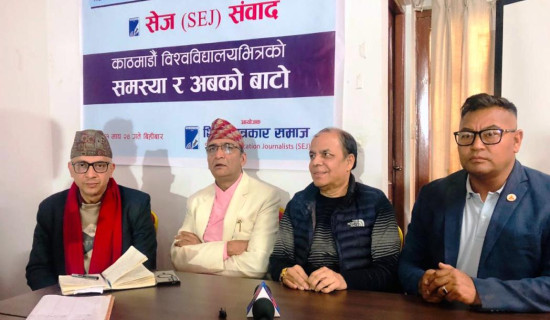- Friday, 7 February 2025
Wordsmithing By Prativa Rana
By Tribhuvan Chandra Wagle
Prativa means talent in Nepali and, on Saturday, it once again proved itself to be an extraordinarily appropriate name for Prativa Rana. Long known as a leader and a social activist, Prativa Rana arrived as the emerging poetic talent in the Nepali literary scene with the release of her anthologies Curtain of Maya’ (English) and ‘Gahirai’ (Nepali).
The two books, which include poems penned by Rana who has served the country on numerous occasions as a cabinet minister, Constituent Assembly member, and ambassador, were launched by Prime Minister Sher Bahadur Deuba amid a program in the capital.
The number of female authors in Nepali literature is relatively low. But these books have now served to increase that number by one and have also contributed to expanding the scope and volume of poetry collections in the country.
The poems in these collections and the words in the poems make it clear that Rana held a river of poesy in her; a river made of emotions and experiences and of seldom expressed verses. Now though, those verses have taken shape, have been expressed, have been codified into words, and have poured out as the poems in these two books.
Through her collections, wordsmith Rana has made the abstract physical and added existence to the metaphysical.
Author Rana has the remarkable ability to craft poems of an equal standard of beauty in both verse and prose. She speaks in the anthology, “When the rainbow tickled the emotions, when the gods bestowed their grace, when the flowers let out their smiles, the poems found their pace [as they came out of me].”
This itself showcases and validates her poetic abilities.
Her feelings tucked away in a diary from 1968 to 2021 have been woven into poems in 2022.
Poet Rana has sung the rhythm of trees, mountains, clouds, flowers, water, waterfalls, night, and birds in the poem and has extended a beautiful commentary on love.
With the lightning flashing in the dark night
Why are you fascinated, O Peacock!
For that beloved of yours
Shall strike you without a second thought
And burn you to ashes
And disappear without a trace
[Translated from Nepali. Poem ‘Mayur’ (Peacock)]
“When I stumbled in the ups and downs of life when thorns came before me in my journey when I saw sorrow and pain that moistened by eyelashes, I used to get inspired to write poems.” Rana has made life and the world her motivation for writing poetry. Her use of symbols and images in her poems evokes her keen sense of beauty and her feeling of love.
You seem to have deeply impressed upon me
Which is why
From the deepest of slumber last night
Beset by your memory
I seem to have woken up
[Translated from Nepali. Poem ‘Gahirai’ (Depth)]
‘Curtain of Maya’ can be a unique experiment in fusing Nepali and English literature. The first two letters are English and the last is the Nepali word for love. While literally meaning a veil of love, it can be interpreted to mean a shade, image, or a view of love. This is a unique experiment in literary creation:
When you are with me I forget myself, I forget the world,
I see nothing but happiness within me, yet at night
I wake up as though from a terrible nightmare
[From English poem 'Forgot You']










-original-thumb.jpg)





